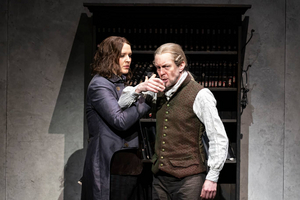Review: FIDELIO, BBC iPlayer

![]() In Beethoven's 250th anniversary year, it seems appropriate for a new version of his only opera, Fidelio, to have been created. However, it begs the question of whether Fidelio is actually a fundamentally 'good' opera?
In Beethoven's 250th anniversary year, it seems appropriate for a new version of his only opera, Fidelio, to have been created. However, it begs the question of whether Fidelio is actually a fundamentally 'good' opera?
The first act is a historical melodrama focusing on the domestic, the second act a more universal political statement, crying out for justice for political prisoners. The dramaturg is famously problematic, with clunky and archaic dialogue which clashes with the quality of the music.
German director Tobias Kratzer, who won almost universal acclaim for his 2019 version of Tannhäuser, seeks to address these problems with his version for the Royal Opera House, by separating the opera into two, distinct halves and restructuring much of the dialogue. He also cuts a lot of the original dialogue, adding text from Beethoven's contemporaries; German playwrights Georg Büchner and Franz Grillparzer. It is not completely smooth, but for the most part, works. It is certainly an improvement.
The themes of hope, love and justice are as relevant as ever, but, especially currently, it is easy to feel a little jaded by the idealistic messages that Beethoven wanted to convey. Jailer's daughter Marzelline is in love with Fidelio, unknowing that Fidelio is actually Leonore, wife of political prisoner Florestan. She is disguised in order to try and rescue her husband. As Leonore works to infiltrate the prison, justice and love overcome tyranny and hatred for a triumphant conclusion.
Kratzer moves the action of the first act to France's Reign of Terror, with gruesome scenes from the guillotine and baskets of severed heads set in period-style. The second act jumps into modern times, with an unengaged audience watching a chained Florestan, only rousing themselves when he is freed, signifying political apathy that is only changed when the struggle is already at an end. The change is stark and effective, particularly through Michael Bauer's lighting. One quibble would be the huge neon stripe that surrounds the entire stage; as effective as it looks, on screen it is a distraction.
Norwegian soprano Lise Davidsen is simply breathtaking as Leonore, with huge stage presence. She is also a fine actor. Her soprano is so powerful, but also incredibly controlled and nuanced; it is her performance that stays with you. Her rendition of Act three's 'O Gott, Welch ein Augenblick' is perfectly delicate and tender and her handling of the incredibly long phrases of 'Abscheulicher' are perfectly unbroken. Beethoven gives the character some brutally difficult sections, with high notes sometimes coming from nowhere. Davidsen not only reaches them all, but sings them with a pitch so perfect it is mesmerising.
The casting of legendary German tenor Jonas Kaufman as Florestan caused such a stir that tickets sold out in record time earlier in the year. However, due to illness, he was replaced by a very able David Butt Philip for the performance recorded for this new BBC screening.
He handles Florestan's central aria 'Gott! Welch' dunkel hier' with great emotion and bravura, but his lyric tenor is almost too beautiful for the role, sometimes lacking the gravelly fortitude needed.
Amanda Forsythe's Marzelline has a newly developed characterisation in this staging; moving from quiet dejection at Leonore's subterfuge to an empowered woman, rallying action against the oppressors in the second half. Her soprano is suitably lighter than Davidsen's, but cannot help but be overshadowed.
Prison warder Rocco is also given a renewed character by a brilliant Georg Zeppenfeld, displaying more of a social conscience than normally portrayed. His voice is brimming with gravitas. Latvian baritone Egils Silinš was also excellent, but all too brief in his appearance as heroic Don Fernando.
The Royal Opera Chorus are on cracking form, being the only thing to vocally compete with Davidsen, particularly in the huge sounds in the final moments of Act II. Pappano conducts with a steely determination, with a darkly Wagnerian influence apparent.
Fidelio will always be a problematic opera, but Kratzer's radical alternative to the original vision are both challenging and interesting. It will not appeal to all, but it is worth seeing for Davidsen's utterly superb performance alone.
Fidelio is now on the BBC iPlayer
Photo Credit: Bill Cooper
Reader Reviews
Videos

